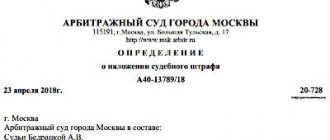Protecting the rights of the victim: when is it necessary?
According to Art.
42 of the Code of Criminal Procedure of the Russian Federation, a victim is an individual who has suffered physical, property, or moral harm as a result of a crime, as well as a legal entity if the crime causes damage to its property or business reputation. A decision on recognition as a victim is made immediately after the initiation of a case or after receiving information about the victim. The Constitution of the Russian Federation and a number of federal laws proclaim an important principle - the state’s protection of the rights of the victim, which provides for the state’s provision of access to justice and compensation for damage caused. In criminal law, the victim is recognized as a figure who can count on the protection of his interests by the state. But in practice, a person who has been harmed by a crime often faces bureaucracy and violation of his rights as a result of the negligent attitude of law enforcement officers to their work, which can be expressed in:
- refusal to accept an application for committing a crime;
- refusal to initiate criminal proceedings;
- denial of recognition as a victim;
- in the refusal to provide measures of state protection under Federal Law No. 119 of August 20, 2004;
- refusal to accept a civil claim and recognition as a civil plaintiff;
- failure to seize the defendant's property to ensure post-conviction restitution;
- in delaying the investigation of the case.
Victims acting as private prosecutors also have a hard time: in fact, they are entrusted with the functions of an investigator and a prosecutor, including collecting evidence and supporting the prosecution in court. Lack of experience and relevant legal knowledge may result in the defendant being acquitted and the victim being charged with all legal costs.
Protecting the rights of the victim in criminal proceedings is a necessity caused by the realities of domestic legal proceedings. Therefore, an injured citizen simply cannot do without qualified legal support.
Grounds for recognition as a victim in a criminal case
They are divided into 2 groups: factual and legal. The former are also called material. These grounds are related to the harm caused by the crime. The second group - legal or procedural grounds - are decisions of investigative and court authorities in a criminal case.
Recognition as a victim means that a person is allowed to participate in legal proceedings. Its status is based on the implementation of a certain set of rights and obligations enshrined in procedural legislation.
The key purpose of an application for recognition as a victim in a criminal case is to restore civil rights violated by the crime, or to compensate for the damage caused by illegal actions, or both. The subject can achieve this by having the appropriate procedural powers. Thus, within the framework of criminal proceedings, a person must be provided with such a set of rights that would allow him to fight to achieve his goals.
Protecting the rights of the victim: assistance from lawyer Sarkisov
One of my priority areas of activity is protecting the rights of the victim. I am ready to provide the following services:
- Consulting the injured person;
- Assistance in preparing and filing a criminal complaint.
- Protecting the rights of the victim at the pre-investigation stage.
- Protection of citizen's rights at the stage of preliminary investigation.
- Upholding the interests and rights of the injured citizen at the judicial stage.
- Comprehensive protection of the rights of a minor victim.
- Representing the interests of a private prosecutor.
- Representing the interests of a civil plaintiff.
All of the above services are provided by collecting evidence, drawing up procedural documentation, interacting with investigative and prosecutorial authorities, and actively defending the Principal’s position in court.
Having a lawyer on your side, depending on the situation, allows you to achieve visible results:
- bringing the perpetrators of the crime to criminal liability;
- recovery in favor of the victim of all losses incurred by him;
- reconciliation with the guilty party.
Procedural nuances of the Code of Criminal Procedure of the Russian Federation
Recognition as a victim in a criminal case presupposes an explanation by officials of his rights and obligations. The effectiveness of their implementation will depend on this. An official must not only fulfill his duties conscientiously, but also do it in a timely manner.
The current legislation does not indicate the moment at which the victim should be explained his procedural options. Article 42 establishes his duties and rights. The procedure and timing of recognition as a victim in a criminal case are not specified at all. In this regard, a problem arises with ensuring the protection of his interests.
Where should the victim turn?
I offer my qualified services to protect the rights of victims at any stage of the criminal process. Each Principal is guaranteed:
- individual approach;
- confidentiality and reliability;
- strict compliance with the terms of the contract;
- availability for communication 24 hours a day, 7 days a week.
My extensive experience allows me to successfully solve problems of any complexity in the shortest possible time. Therefore, if you want to achieve positive results, I am ready to help you.
Moment of admission of the victim to production
A decision on recognition as a victim in a criminal case serves as a formal basis for involving the victim of a crime in the preliminary investigation. The moment of immediate admission of a person will depend on the discretion of the investigative authorities and the presence of a sufficient and necessary set of factual grounds - information about causing harm to someone.
In practice, there are often cases when the victim begins to participate in the case immediately after its initiation. It also happens, however, that investigative authorities have to take measures to search for victims. Taking into account all that has been said, it is not possible to establish any specific, universal moment for the admission of a crime victim to the case. It will be determined in each case individually, taking into account the circumstances.
The Constitutional Court again emphasized that the testimony of victims and witnesses is made public in exceptional cases
February 28 , part 2 of article 240, part 2 of article 281, part 2 of article 297, paragraph 2 of article 307, paragraph 7 of part 3 of article 389.28 and paragraph 5 of article 401.10).
According to the applicant, the contested provisions allow the reading of testimony of witnesses in a criminal case, despite the objections of the defense, allow the courts, when considering the case on the merits, not to fully examine the accused’s version of events and leave without consideration the arguments of his appeals and cassation complaints.
Having studied the circumstances of the case, the Constitutional Court found no grounds for accepting the complaint for consideration. With reference to its own practice (Definitions dated December 7, 2006 No. 548-O, dated July 16, 2013 No. 1137-O, dated December 23, 2014 No. 2796-O, etc.), the court recalled that the announcement of testimony, received at the stage of preliminary investigation is considered as an exception and is permissible only in cases provided for by law (Articles 240, 276, 281 of the Code of Criminal Procedure). This is due both to the need to eliminate inequality in the procedural capabilities for examining evidence between the defense and the prosecution, who interviewed victims and witnesses during pre-trial proceedings and drew up the corresponding protocols, and to the freedom of the court from outside influence when assessing the testimony of participants in criminal proceedings.
The Constitutional Court explained that Art. 281 of the Code of Criminal Procedure does not provide for the possibility of a broad interpretation of the list of cases that allow the reading in court of testimony previously given by victims and witnesses who were absent at the hearing. Doubts that arise when assessing evidence read out in court for admissibility and reliability must be interpreted in favor of the accused. “If the court announces – if there are grounds specified in the law – the evidence of an absent person incriminating the accused and its subsequent use, the parties must be given the opportunity to protect their interests in court by all means provided by law,” the Determination states.
Thus, the Constitutional Court emphasized, the disclosure of testimony given by a victim or witness who did not appear in court during the preliminary investigation is permissible only in exceptional cases provided for by law, if a proper assessment of the reliability of the testimony as evidence is ensured, and the accused had the opportunity to ask questions to this person or challenge the reliability of his testimony at the stage of pre-trial proceedings or in previous stages of the trial (Part 2 of Article 281 of the Code of Criminal Procedure). In this case, the prosecution is obliged to take exhaustive measures to ensure the participation of a witness or victim who did not appear at the court hearing.
The Definition also notes that law enforcement practice gives a similar meaning to the norms of criminal procedure law. Thus, in paragraph 4 of the Resolution of the Plenum of the Armed Forces of the Russian Federation dated November 29, 2016 No. 55, it is explained that the court does not have the right to read out, without the consent of the parties, the testimony of a victim or witness who did not appear, as well as to reproduce at the hearing materials of video recording or filming of investigative actions with their participation.
The court also does not have the right to refer to this evidence in the verdict if the defendant was not given the opportunity to challenge it at previous stages of the proceedings (for example, during confrontations, ask questions to the victim or witness with whose testimony the defendant does not agree, and express objections to them).
The Constitutional Court emphasized that the information contained in the read-out testimony, like other evidence, can be used as the basis for the court’s conclusions only after verification and assessment according to the rules of Art. 87 and 88 Code of Criminal Procedure. In this case, the court does not have the right to refer to the evidence available in the case in support of its conclusions if it has not examined it and is not reflected in the protocol.
The Constitutional Court also recalled that courts, when assessing evidence in a criminal case, including the read-out testimony of a witness or victim who did not appear at the hearing, must take into account all the circumstances related to the reasons for their failure to appear and their participation in the previous stages of criminal proceedings. The courts must also establish whether the suspect, accused or his defense attorney has the opportunity to challenge this testimony in the prescribed manner.
In addition, the Court explained that the Code of Criminal Procedure directly includes the subject of proof, including the event of the crime (time, place, method and other circumstances), the guilt of the person in committing it, the form of guilt and motives (clauses 1 and 2 of Part 1 of Art. 73). The provided procedure for proof requires the verification and assessment of all evidence from the point of view of its relevance, admissibility and reliability, and in total - sufficiency for resolving the case (Article 87 and Part 1 of Article 88). It also determines that a sentence is recognized as legal, reasonable and fair if it is made in accordance with the requirements of the Criminal Procedure Code and is based on the correct application of the criminal law (Part 2 of Article 297). The descriptive and motivational part of such a verdict must contain the evidence on which the court’s conclusions regarding the defendant are based and the reasons for which the court rejected other evidence (clause 2 of Article 307).
In turn, the provisions of Art. 389.28 and 401.10 of the Code of Criminal Procedure expressly provide that the listed court decisions must set out the arguments of the applicant and the reasons for the decision taken on the complaint. The provisions of these articles do not allow courts to refuse to consider and evaluate all arguments of statements, petitions or complaints of participants in criminal proceedings, but require them to motivate their decisions by indicating specific, sufficient reasons for which these arguments are rejected.
In this regard, the Constitutional Court concluded, the controversial norms do not violate the constitutional rights of the applicant, and the arguments of the complaint boil down to challenging procedural decisions in a criminal case.
According to the head of the criminal practice of JSC “KRP” Mikhail Kiriyenko, the Definition was not revolutionary: “The body of constitutional justice did not deviate from its position, which it previously indicated when assessing the requirements of Art. 281 Code of Criminal Procedure."
The expert suggested that in the complaint the applicant referred to a particular case of violation of his rights. At the same time, he noted that the courts continue to broadly understand the provisions on the possibility of reading out the testimony of witnesses who did not appear, which grossly violates the rights of defense, and expressed disagreement with the conclusion of the Constitutional Court that Part 2.1 of Art. 281 of the Code of Criminal Procedure guarantees respect for the right to defense.
Mikhail Kiriyenko believes that the grounds for disclosing testimony should be clearly indicated in the Code of Criminal Procedure in order to prevent a broad interpretation by the law enforcement officer. “References to the possibility of challenging testimony at other stages, as well as the effectiveness of such an opportunity, are a very subjective point, which the court often interprets without taking into account the guarantee of adversarial action not only in general, but also when assessing each piece of evidence,” the lawyer explained. “In addition, at the time of such an opportunity, the accused may not have a certain amount of information guaranteed by the legislator based on the results of the preliminary investigation, which can be used for defense.”
Senior Partner of ZKS Law Firm Andrey Grivtsov agreed with the conclusions of the Constitutional Court regarding the possibility of reading out the testimony of absent witnesses only in exceptional cases and providing the defense with the opportunity to challenge this testimony at previous stages. “Recently I have not come across a different interpretation of Part 2.1 of Art. 281 Code of Criminal Procedure. Apparently, judges are oriented towards such law enforcement,” he noted.
According to the expert, the prosecution has found a new loophole to circumvent the defense’s ability to question witnesses during the trial who may give evidence different from what they gave at the preliminary investigation stage. “A person (this is especially often practiced with persons who have entered into a pre-trial cooperation agreement) appears in court and refuses to testify with reference to Art. 51 of the Constitution, after which the state prosecutor files a motion to read out previous testimony in accordance with Part 4 of Art. 281 Code of Criminal Procedure. The court grants the petition, ignoring the defense’s arguments about the impossibility of challenging the testimony of such a person and asking him questions,” the lawyer explained.
In conclusion, he added that he had twice encountered a similar situation in so-called “high-profile criminal cases”, and, unfortunately, the appellate instance (and this was the Supreme Court) did not respond to the problem.
Drawing up an application
Currently, there is no unified form for applying for recognition as a victim in a criminal case. In practice, however, certain rules for its preparation have emerged. Firstly, a written request to be recognized as a victim in a criminal case is submitted to an official (inquirer/investigator). There are no forms for such statements, so the victim of a crime provides information in free form. The header of the document indicates the government agency or official in charge of the case, the applicant’s full name, and his contact information.
The petition shall indicate: the reasons and grounds for which the person should be recognized as a victim, justification for the damage caused (including moral damage). The date of compilation and signature are required.






